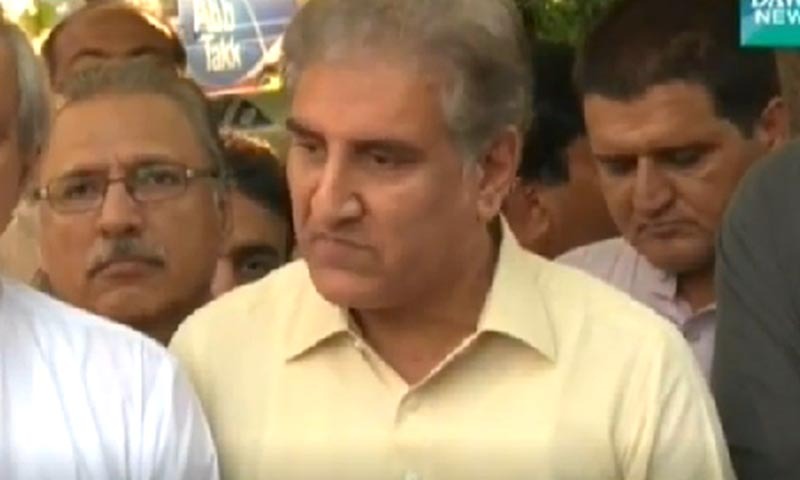ISLAMABAD: The Pakistan Tehreek-i-Insaf and the government held yet another round of talks on Monday, precisely the 12th sitting in which both sides concluded their arguments and now the decision lies with leaders of the two sides.
Just before midnight, Senator Ishaq Dar, who led the government team, and Shah Mehmood Qureshi, chief negotiator of the PTI, appeared before the media and made brief statements.
According to Mr Qureshi, whatever the PTI had to say was shared in detail with the government and now it’s up to the latter to respond.
Senator Dar quickly replied that as far as one issue (the prime minister’s resignation) was concerned it was non-negotiable, everything else came under discussion. “We have almost reached consensus on all other issues,” he claimed.
Talking to Dawn, Dr Arif Alvi, a senior PTI leader who throughout has been part of the talks and even attended the first session of the meeting held early afternoon, said the terms of reference (ToRs) of the proposed judicial commission and the prime minister’s resignation were two sticking points. One thing the PTI wanted in the ToRs of the commission, he said, was clarity in its mandate: how and what the commission would actually investigate.
In its written proposals, the PTI said the commission should have the power to investigate, prosecute and issue a binding judgment for the contesting parties — the government and the PTI. The primary function of the commission, according to the PTI, will be to “undertake an independent investigation into the allegations levelled by PTI about rigging or manipulation of the 2013 elections and based on its investigation to submit within 30 days a legally binding and enforceable final report”.
The government is against such a commission which it had in its written response to the PTI’s proposals termed super election tribunal. The government insisted on Article 225 of the Constitution which only allowed election tribunals to deal with applications regarding rigging.
When asked if Monday’s meeting meant that deadlock persisted, Dr Alvi said the two sides had in-depth face-to-face discussions and presented their arguments. “As the lead negotiators from the two sides have said the final decision will be made by their respective leaders, let’s see what they decide. In politics, there always remains possibility of moving forward,” he added.
Once again, both sessions of the meeting were held at the residence of PTI General Secretary Jahangir Tareen Khan. Senator Dar and Zahid Hamid represented the government side, while the PTI team comprised Mr Qureshi and Mr Tareen.
After the first session, Senator Dar told waiting journalists: “We are coming back for talks.”
But on the insistence of media, Mr Qureshi said: “The PTI has been very reasonable and demonstrated considerable flexibility in its demands. We have been very positive in our attitude.”
A senior PTI leader told Dawn that until know it seemed the government was only interested in buying time. “At every meeting, the government negotiators give an impression that they are serious in talks, but at the same time refuse to move even an inch from their stated positions.”
Although with every passing day pressure was building both from within the PTI and outside on Imran Khan, but if the government believed that by defying “us in our just demands” it would emerge as a winner, its advisers were highly mistaken, he said. “Now everybody is talking about the need for electoral reforms and investigation into the election results; therefore, even if the prime minister doesn’t resign as a result of our demand, the government cannot run away just like that.”
Published in Dawn, September 9th, 2014
















































Dear visitor, the comments section is undergoing an overhaul and will return soon.